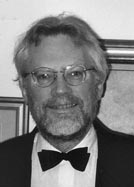|
|
 |
Dr. Joscelyn Godwin was born in England and received a B.A. degree and M.A. in Music there. He came to the U.S. in 1966 and received a Ph.D. from Cornell in 1969. Godwin
taught at Cleveland State University for two years and then began a career with the Music Department at Colgate University, where he has been since 1971. Dr. Godwin has written a great deal on music, literature, and Western esoteric traditions, including Hermeticism and alchemy. He has also translated a number of books, though perennialist readers may be most familiar with his translation of Guénon's The Multiple States of Being. Dr. Godwin contributed two essays to this journal.
|
|
|
|
 |
Mouse over this icon to see the abstract of the article. |
• Click on the header on any column to sort.
• Click on an issue listing (e.g. "Vol. 1, No. 1. ( Winter, 1967)" ) to see the full contents of only that issue.
|
| Article |

This essay traces the gradual spiritual decline of Western music from the sacred monophony of Christian Gregorian Chant, through the increasingly secular polyphonic music of the Middle Ages, to later Renaissance, Operatic, and Romantic styles. Godwin shows that the evermore ornamented styles of Western music are a departure from the ancient and original function of music, which symbolized, beyond the capacity of language, the presence of God in the world. With the discovery of polyphonic sound, for instance, Godwin claims that Western culture began to delight in human creativity, forgetting the deeper meaning and function of music and turning it into “a kind of substitute for religion or mysticism”.
| Spiritual Currents in Music | Godwin, Joscelyn | |
Vol. 5, No. 2. ( Spring, 1971)
| Christianity |
| Article |

I.R.Y.C (Joscelyn) Godwin affords us a glimpse of the traditional world of music in this introduction to the Institutione Musicae of Boethius in which there are described three different types of musicians: the theorist, composer and performer and the hierarchical roles they play. Irwin contrasts this with modern day music in which the theorist has disappeared and the performer is now given pride of place with the audience making up the third element. As a result, contemplativity, which is the true end of music, has all but disappeared. However, all is not lost as the mechanical production of music allows us to become familiar with great works and in hearing them repeatedly opens a door onto the spiritual realm.
| Boethius' Three Musicians | Godwin, Joscelyn | |
Vol. 4, No. 4. ( Autumn, 1970)
| Comparative Religion |
|
2 entries
(Displaying results 1 - 2)
|
View : |
|
 |
Loading... |
|
Page:
[1]
of 1 pages
|
|
|
|